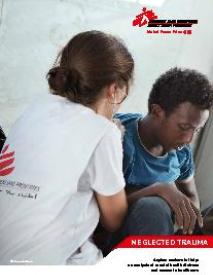Neglected Trauma : Asylum seekers in Italy: an analysis of mental health distress and access to healthcare
The many humanitarian crises of recent years, the persistence of conditions of war and the systematic violation of human rights in many countries have forced millions of people to flee, undertaking journeys that are often very dangerous. According to data from the UN Refugee Agency (UNHCR), there are now 65,3 million of people who left their home in the world. Recent evidence shows an increased risk of mental disorders among forced migrants and asylum seekers.
In addition to the traumatic events they may have suffered before and during their journeys, some of them show signs of stress and suffering in relation to their current situation, attributable to their exile in a strange land. MSF conducted an investigation fromJuly 2015 to February 2016 to study the mental health needs of asylum seekers residing in extraordinary reception centres (CAS) and their access to local services.
The analysis – conducted in the provinces of Milan, Rome and Trapani, which were chosen because of their large numbers of reception centres – benefited from a twopronged approach using qualitative and quantitative methods. The use of focus groups and in-depth interviews with asylum seekers, Healthcare workers and CAS operators made it possible to decipher the needs of the residents of the reception centres, the clinical paths taken where necessary and the response of local health services.
The quantitative research was conducted based on the data collected by Medecins Sans Frontieres/ Doctors Without Borders (MSF) from October 2014 to December 2015 during psychological support activities with asylum seekers resident in the CAS in the province of Ragusa. This provideda good starting point for identifying the extent of the problems and the potential factors influencing them.
Geachte bezoeker,
De informatie die u nu opvraagt, kan door psychotraumanet niet aan u worden getoond. Dit kan verschillende redenen hebben,
waarvan (bescherming van het) auteursrecht de meeste voorkomende is. Wanneer het mogelijk is om u door te verwijzen naar de bron
van deze informatie, dan ziet u hier onder een link naar die plek.
Als er geen link staat, kunt u contact opnemen met de bibliotheek,
die u verder op weg kan helpen.
Met vriendelijke groet,
Het psychotraumanet-team.
32 pages | [Geneva] : Médecins Sans Frontières (MSF)
http://www.msf.org/sites/msf.org/files/neglected_trauma_report.pdf


